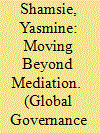| Srl | Item |
| 1 |
ID:
084057


|
|
|
|
|
| Publication |
2008.
|
| Summary/Abstract |
This article builds on the work of scholars who have explored the links between poverty reduction and sustainable peace. It examines the recent shift by bilateral and multilateral donors to 'pro-poor' development strategies in fragile states by considering the case of Haiti, a country with high levels of poverty and intense donor interest. The paper examines whether recent insights on poverty reduction are driving the current economic development strategy in Haiti. It does so by comparing the strategies and programs advanced during the first round of peacebuilding efforts (1994-2000), prior to donors embracing the poverty reduction imperative, with current efforts (2004-07), which are ostensibly aimed at poverty reduction.
|
|
|
|
|
|
|
|
|
|
|
|
|
|
|
|
| 2 |
ID:
137078


|
|
|
|
|
| Summary/Abstract |
This paper explores the historical and contemporary sources of food insecurity in Haiti. It begins by detailing the impact of colonial legacies on the Caribbean region as a whole and on Haiti in particular. The adverse consequences associated with this period include deforestation, soil infertility and food-import dependence. The paper then turns to more contemporary trends, namely the influence of 30 years of neoliberal ideology. It argues that the belief that Haiti can best achieve food security through the pursuit of comparative advantage, a notion advanced and supported by powerful international and domestic actors, has served to reinforce harmful historic trends. We support this argument with recent fieldwork findings that highlight how the construction of a new export processing zone (EPZ), following the 2010 earthquake, has generated troubling environmental and food security concerns.
|
|
|
|
|
|
|
|
|
|
|
|
|
|
|
|
| 3 |
ID:
078702


|
|
|
|
|
| Publication |
2007.
|
| Summary/Abstract |
In 1995-1996 the hemisphere's multilateral forum, the Organization of American States, launched a conflict prevention and management program in Guatemala entitled "Culture of Dialogue: Development of Resources for Peacebuilding in Guatemala." The overarching goal was to help Guatemalans address ongoing tensions and political disputes, particularly related to the implementation of the historic peace accords. This article provides a detailed account of this OAS attempt to prevent and diffuse conflict, suggesting that it represents a novel effort that draws heavily on the conflict transformation approach to conflict management. Still, it argues that, at the conceptual level, there appears to be a disconnect between this approach to conflict prevention and the Organization's broader approach to peacebuilding, which embraces a free-market path to development, including the implementation of market-oriented economic reforms.
|
|
|
|
|
|
|
|
|
|
|
|
|
|
|
|